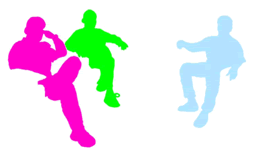Jeremy Deller
Combining enthusiastic reports about George W. Bush’s favourite hamburgers with footage of millions of bats emerging from a subterranean cave into the evening sky, Jeremy Deller’s Texas film Memory Bucket produces a collage of material whose sensations lie not simply in the pictorial material shown. Neither in George W. Bush’s photograph in a roadside restaurant, nor in the rows of guns for sale in the shop next door behind a life-size cut-out of the president.
Rather, the work’s sensations lie in the way it confuses any clear positioning. In statements about the Waco Massacre it becomes impossible to ascertain whether the sect was really ever dangerous and how the state’s excessive use of force could ever be justified. During an anti-Bush protest in the town, Quakers utter their reservations about the administration, whilst in the restaurant of the local petrol station the waitress explains with stupefying banality how the Secret Service disconnects the petrol pumps whenever the president turns up for food.
This series of accounts closes with the crackling of bats emerging from a cave, an image that takes up nearly half the duration of the film and refers back to a very different type of Texan romanticism. That this can be the end of a film that starts so very differently, is evidence above all of Deller’s own positioning in relation to the politically and socially charged material of his work. Even if his sympathies for protesters in Texas are as clear here as they are elsewhere, Deller does not really assume positions, but rather presents and collides them in all their virulence.
History and/or politics are translated into an active view of the world and culture of the recent past. Memory Bucket, with all its inner contradictions, is thus also a document of Deller’s own having-been-there, oscillating between an historical account and the diverse forms of confused involvement.
By Edgar Schmitz
"Memory Bucket" (2003) (DVD 21 Hrs 44 Mins)
|









